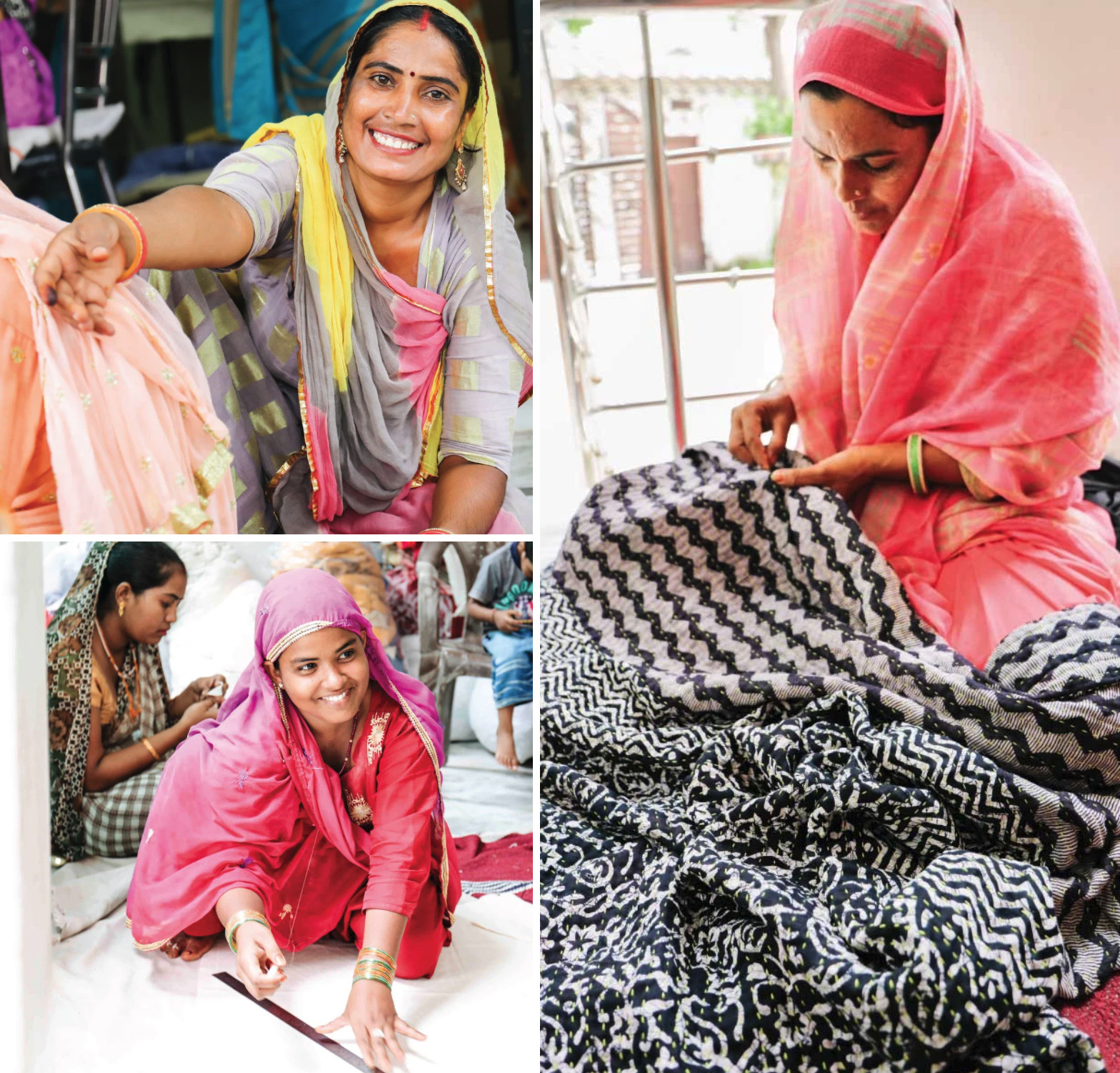Margaret Clines, the Creative Director and COO of Anchal Project, leads a nonprofit social enterprise revolutionizing the fashion industry. Anchal Project tackles the exploitation of women globally, using design thinking to generate empowering employment, craft unique products, and cultivate markets that champion social good.
Ten years ago, Margaret’s journey began while studying Architecture at the University of Kentucky, parallel to her sister Colleen’s graduate studies at RISD. Colleen’s seminar on design for development sparked a transformative trip to India, marking the inception of Anchal Project.
The course challenge—designing a textile product to benefit a community in need—reshaped their lives. They partnered with New Light, an NGO in Kolkata supporting women within the sex trafficking district. The initial concept was to market traditional, home-crafted textiles by these women in the United States, creating a bridge to economic opportunity.
Upon graduating and returning to Louisville, the sisters launched this vision, aiming to fuse design innovation with social responsibility and community empowerment. This marked their entry into what would become the world of impactful Aanchal Fashion.
Initially, their focus was purely on social impact. Textiles were a secondary consideration, chosen for their relevance to the local context. The first years saw Anchal as a side project while they learned the intricacies of the market. As they gained expertise in home goods and accessories, their product line expanded, and the Anchal story evolved. Moving to Jaipur and collaborating with a different NGO in Ajmer, they now partner with over 160 artisans, significantly broadening the reach of aanchal fashion.
Until 2016, recycled saris formed the basis of their signature quilts. However, to ensure scalability and consistency for wholesale business, they transitioned to GOTS (Global Organic Textile Standard) cotton. This shift to custom products and controlled fabric sourcing was crucial for business expansion beyond vintage materials, allowing aanchal fashion to reach a wider audience.
Today, Anchal Project operates with a structured team. In Louisville, a team of 6 manages operations, while in India, a Director, Manager, and 11 Project Assistants oversee product coordination within the NGO. This Indian team distributes work among 160 artisans, maintaining weekly communication with the Louisville headquarters. Colleen and Margaret conduct annual design workshops in India, fostering continuous innovation in aanchal fashion. New artisans begin with quilt making, progressing to senior artisan status after three years, enabling them to craft more complex pieces and potentially become Project Assistants.
The focus remains on refining product production and enhancing the program’s impact. This partnership is a testament to growth and effective collaboration, shaping the landscape of ethical aanchal fashion.
The synergy between sisters Colleen and Margaret is a cornerstone of Anchal Project’s success. Their roles have naturally evolved since their early twenties, forging a highly effective working relationship. Colleen is described as the visionary, brimming with big ideas and creative marketing strategies. Margaret leans towards the technical and pragmatic, grounding Colleen’s expansive ideas with structured creativity.
Margaret sees herself as more technically inclined, finding creative solutions within defined parameters, while Colleen pushes beyond conventional boundaries. Their architectural backgrounds inform their work styles: Colleen, with her landscape architecture focus, embraces a flowing, organic approach, whereas Margaret’s architecture training brings a more controlled, methodical perspective to developing aanchal fashion lines.
Design Thinking is integral to Anchal’s methodology, applied to both product development and program expansion in India. This approach fosters a flexible, open, and safe creative environment. It emphasizes listening to customers and artisans, promoting collaboration, and prioritizing empathy. Perfectionism is discouraged in favor of iterative improvement and constant evolution, crucial for the dynamic world of aanchal fashion.
Design Thinking operates as an ongoing cycle, allowing for continuous improvement and innovation. Starting with quilts as their foundational product, Anchal explored design challenges based on the artisans’ existing skills, initially focused on simple running stitches. Experimentation with dimensions and techniques led to product diversification. Mastering zipper application was a pivotal achievement, unlocking the potential for a broader range of products and designs within aanchal fashion.
Unlike conventional businesses that outsource production, Anchal’s nonprofit ethos centers on providing dignified employment and respect to women artisans. This core mission drives their approach to aanchal fashion, prioritizing ethical production and artisan empowerment above all else.
Anchal Project’s impact extends across artisan communities through skills training, employment, education, and health initiatives. Their model, addressing systemic issues, requires long-term commitment and adaptability. Without external investors and detached from aggressive sales targets, their focus remains steadfastly on artisans and program sustainability. Textiles are the medium, but artisan well-being is the ultimate goal of aanchal fashion.
Early impacts included artisans being able to afford fresh food, education for their children, and home improvements. Now, empowerment is seen in artisans purchasing cell phones, jewelry, and investing in their own futures. This economic independence and personal investment highlight the profound impact of aanchal fashion on individual lives.
Many artisans have become primary breadwinners, gaining increased control over their lives. Initially, challenges included resistance from husbands and in-laws, reflecting traditional gender roles. However, as artisans achieved financial success and recognition—including features on Madewell storefronts—family perceptions shifted, acknowledging the economic and social value of their contributions to aanchal fashion.
Anchal’s model is replicable in other contexts, provided it remains community-led and independent. The key is local ownership and culturally sensitive implementation, ensuring the principles of aanchal fashion can empower diverse communities.
Collaborations with prestigious entities like the Guggenheim Museum, Madewell, and Urban Outfitters have amplified Anchal’s reach and impact. These partnerships are carefully chosen based on shared values and a commitment to product integrity and ethical storytelling. Anchal seeks to partner with brands that understand and value their mission, using these platforms to promote conscious consumerism and the principles of aanchal fashion to a wider audience.
The rise of “fast fashion” presents a stark contrast to mission-driven “slow” fashion brands like Anchal. Anchal directly combats fast fashion’s exploitative practices, advocating for product longevity and mindful consumption. Their heirloom-quality pieces are designed to last, representing an investment in both quality and ethical production. They underscore that excessively cheap clothing often comes at the cost of worker exploitation, emphasizing the importance of transparency and fair wages in aanchal fashion.
Each Anchal product carries a hand-embroidered tag bearing the maker’s name, a personal touch that narrates a story of empowerment and connects consumers directly to the artisans behind aanchal fashion. As a small company committed to sustainability, Anchal creatively utilizes scrap materials, engineering designs to minimize waste. This contrasts with larger companies that often lack the agility or commitment to optimize textile usage, resulting in greater environmental impact.
For consumers, embracing slow fashion involves a shift in perspective, moving from price-driven purchases to value-based choices. It requires questioning the origins of clothing and understanding the broader impact of consumption. Consumers possess significant power to drive change by supporting ethical brands and advocating for transparency. Especially during times of global uncertainty, conscious purchasing decisions can sustain fair trade businesses and empower marginalized communities through aanchal fashion.
Transitioning to ethical consumption is a gradual process. It’s about making informed choices one step at a time, challenging oneself to opt for better alternatives when possible. While ethical brands may have higher price points, the investment reflects fair wages, sustainable practices, and lasting quality, embodying the true value of aanchal fashion.
Consumer response to Anchal’s products and mission has been overwhelmingly positive. Customers are drawn to the designs and deeply connect with the artisans’ stories. Initially, Anchal prioritized storytelling, but shifted to emphasize design appeal first to compete effectively in the market. The Guggenheim Museum partnership exemplified this synergy, where design and story equally captivated audiences, leading to custom pieces that resonated deeply. This approach fosters lasting customer relationships, demonstrating that fair trade products, particularly in aanchal fashion, can be both contemporary and impactful. Anchal aims to deliver not just beautiful products, but also the rewarding feeling of making a positive difference through conscious consumption.
Starting and running Anchal Project has presented both profound rewards and significant challenges. Navigating the nonprofit sector as young women required perseverance to be taken seriously and demonstrate tangible impact. Personal, professional, and financial sacrifices were necessary, but the knowledge of transforming lives made it worthwhile. An unwavering belief in their mission and the power of aanchal fashion fueled their journey.
The daily challenges are diverse and constant, which Margaret and Colleen find energizing. They thrive under pressure and approach challenges with a competitive spirit. The rewards are equally abundant, particularly the direct connection with the artisans in India and witnessing the transformative impact of their work. These women are the driving force behind aanchal fashion and the daily motivation for the sisters. Anchal has afforded them greater freedom and control over their professional paths compared to traditional architecture careers, enabling them to witness firsthand the positive change they are creating through design and ethical business practices. This connection to creation and creators is what makes the world of aanchal fashion truly meaningful.
In the face of Covid-19, Anchal Project has demonstrated remarkable resilience and adaptability. Despite приостановленные wholesale orders and production challenges in India due to lockdowns, their dedicated team has pivoted effectively. Focusing on their strong online presence and social media engagement, they also innovated by producing face masks. This unexpected product line not only met a critical need but also provided continued support for artisans during a standstill in regular production.
Margaret and Colleen themselves joined the sewing efforts, highlighting their commitment to their mission and community. While the future of production in India remains uncertain, Anchal remains optimistic, particularly as a home goods provider in a time when people are investing more in their living spaces. They hope consumers will choose aanchal fashion to enhance their homes while supporting ethical practices and artisan empowerment.
For aspiring mission-driven entrepreneurs, Margaret advises acknowledging the demanding nature of the journey, requiring grit, sacrifice, and unwavering dedication. Success is often visible, but the hard work behind it is less so. It’s crucial to stay focused on one’s own path without succumbing to comparisons. Margaret emphasizes that no one has all the answers, and self-reliance is key. Entrepreneurs must trust their expertise and drive their vision forward.
Colleen adds the importance of vocalizing one’s mission and believing in its value. Overcoming the pursuit of perfection and embracing vulnerability in sharing one’s work is essential. Belief in one’s mission and the courage to share it are vital for success in creating impactful ventures like aanchal fashion.

